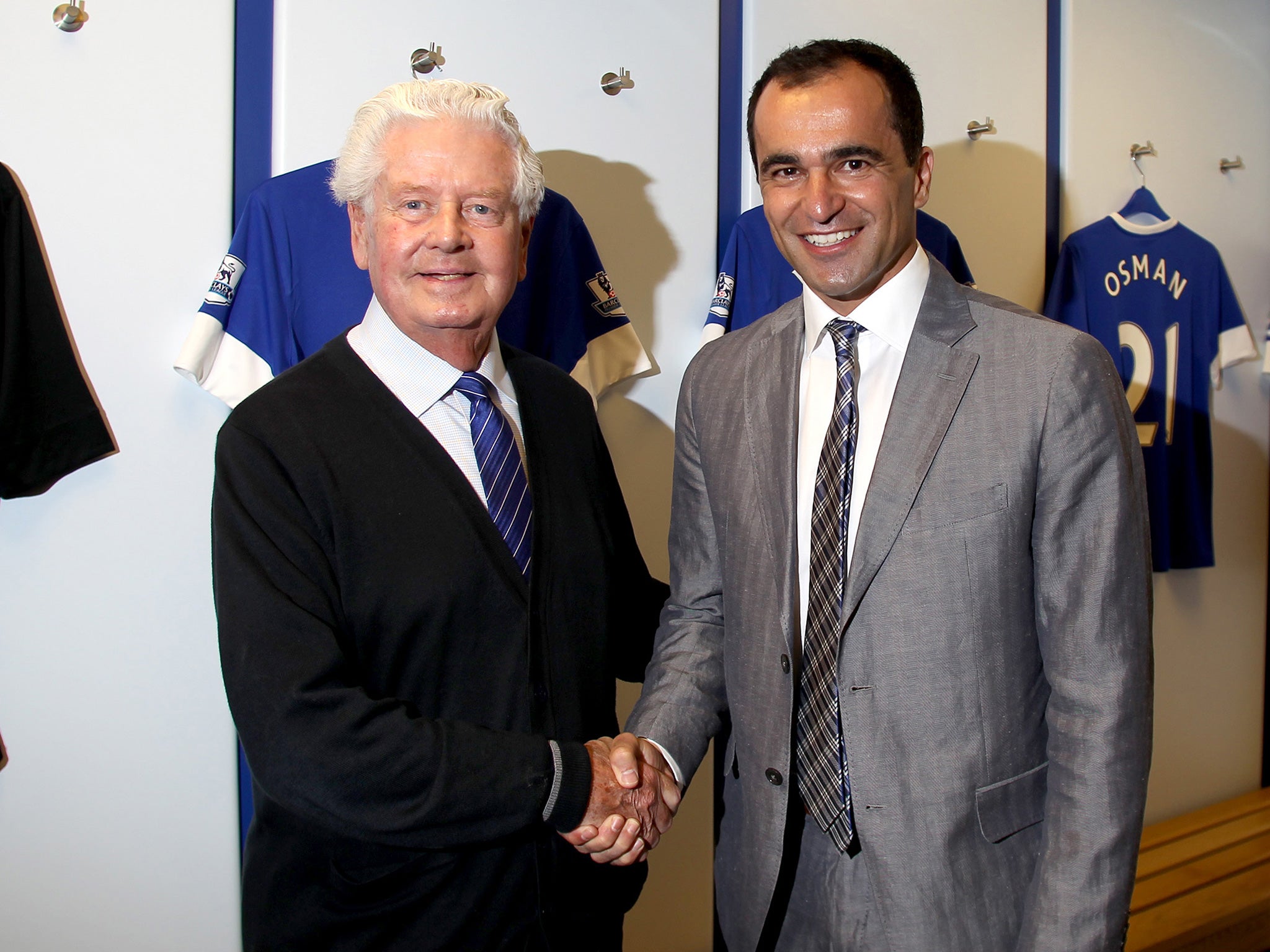Sir Philip Carter: Everton chairman who helped transform domestic football as a leader of the group that founded the Premier League

Because he never kicked a ball in anger, Sir Philip Carter was amused, and often embarrassed, to hear himself hailed as an “Everton legend”, an epithet he owed to the firm leadership he showed in the face of adversity and the four glorious, trophy-laden seasons which ensued.
But Carter, who has died at the age of 87 following a short illness, made an impact far beyond the Goodison Park boardroom he dominated from 1978 to 1991. He also played a key role in Littlewoods becoming the biggest private company in Europe by the 1980s. More controversially, he combined his football and business acumen as a prime mover in the formation of the Premier League.
The breakaway league, which has become the world’s most lucrative domestic competition since the split with the Football League in 1992, had its origins in meetings which Carter organised as far back as 1980. Interviewed by journalist Joe Lovejoy for the book Glory, Goals and Greed: Twenty Years of the Premier League, he revealed that he and representatives of Manchester United and Tottenham Hotspur met officials from Celtic and Rangers that year to discuss a possible “Super League”.
The talks with Glasgow’s Old Firm proved unproductive, Carter recalled, and the self-styled elite of English clubs – intent upon exerting greater influence and enjoying revenue to match – approached the Football Association about their ideas. “They said: ‘No chance, we’ll block it’,” he told Lovejoy. “So our plans were put on hold, but with talks continuing behind the scenes.”
More than anybody fronting a First Division club, Carter kept alive the vision of what became the Premier League as English football reeled from disasters at Bradford, Heysel and Hillsborough. In 1983 he had informed Sir Norman Chester’s inquiry into the game’s finance and structure that the top clubs were “increasingly intolerant” of being “required to subsidise clubs in the lower divisions”.
Carter was actually president of the Football League from 1986 to 1988, in which capacity he was involved in preparations for the centenary of the organisation which critics of the “Super League” claimed would be undermined by its inception. By 1991, when he was knighted, the momentum generated by the “Big Five” (Everton, Liverpool, Manchester United, Arsenal and Spurs) was irresistible. The FA reversed its opposition and the new set-up kicked off in 1992 as the FA Premier League.
Carter was born in Scotland, his family moving to Liverpool when he was two, and he saw his first Everton match aged four. After attending Waterloo Grammar School he volunteered to join Fleet Air Arm in 1945. Three years later, at 21, he began a 35-year career with Littlewoods, the football pools and retail giant, becoming a confidant of founder Sir John Moores, who was also Everton’s chairman. He rose from store manager to chief buyer and was managing director from 1976 until he retired in 1983.
In 1978, two years after becoming an Everton director, Carter took over as chairman, and in 1981 he appointed Howard Kendall as player-manager. By the autumn of 1983, after the team lost at home to Luton Town and Norwich City before sub-15,000 crowds, a leaflet was distributed outside the ground which demanded: “Kendall and Carter out: 20,000 stay-away fans can’t be wrong.”
Carter stated “unequivocally” that Kendall had the board’s “absolute support”. Nevertheless, media reports intimated that his loyalty might reach breaking point if Everton went out of the League Cup at Third Division Oxford. Trailing until a late equaliser by Adrian Heath, they won the replay and their fortunes were suddenly transformed.
They won the FA Cup, lost the League Cup final unluckily against Liverpool, and broke their neighbours’ grip on the League title in 1984-85 and 1986-87, lifting the European Cup-Winners’ Cup in style along the way. Carter, who in 1982 had switched Everton’s bank to one that would sanction the £60,000 overdraft needed to sign Peter Reid, repeatedly allowed Kendall and his successor Colin Harvey to break the club’s transfer record.
He relinquished the chairmanship in 1991, left the board two years later when Peter Johnson bought Everton but returned as chairman in 1998 after Bill Kenwright’s takeover. In 2004 he became honorary life president and in 2008 he returned to the board again.
At one point in the 1980s, as well as being Everton chairman, Football League president and a member of the League’s Television Negotiating Committee, he served on the Merseyside Development Corporation, held the posts of vice-president of the FA and was chairman of the Merseyside Tourism Board, the Empire Theatre Trust and Liverpool Conservative Association.
However, it was not all quietly effective behind-the-scenes manoeuvring or meetings in smoked-filled rooms. In 1987, after Liverpool’s John Barnes was racially abused by Everton supporters, Carter made national-newspaper headlines by telling the perpetrators: “Stay away, you scum.”
Philip David Carter, football administrator and businessman: born Glasgow 8 May 1927; CBE 1982; Kt 1991; married Harriet Rita Evans (two daughters, one son); died Oxton, Cheshire 23 April 2015.
Subscribe to Independent Premium to bookmark this article
Want to bookmark your favourite articles and stories to read or reference later? Start your Independent Premium subscription today.

Join our commenting forum
Join thought-provoking conversations, follow other Independent readers and see their replies